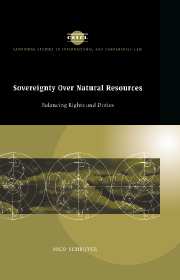Book contents
- Frontmatter
- Contents
- List of boxes, figures and tables
- Preface
- Acknowledgments
- List of abbreviations
- List of main symbols used in UN documents
- Glossary
- Table of cases
- 1 Introduction
- PART I The birth and development of the principle: the UN General Assembly as midwife
- PART II Natural-resource law in practice: from creeping national jurisdiction towards international co-operation
- Introductory remarks to Part II
- 6 International investment law: from nationalism to pragmatism
- 7 The law of the sea: extension of control over marine resources
- 8 International environmental law: sovereignty versus the environment?
- PART III Balancing rights and duties in an increasingly interdependent world
- Appendices
- Bibliography
- Index
- Books in the series
6 - International investment law: from nationalism to pragmatism
Published online by Cambridge University Press: 23 October 2009
- Frontmatter
- Contents
- List of boxes, figures and tables
- Preface
- Acknowledgments
- List of abbreviations
- List of main symbols used in UN documents
- Glossary
- Table of cases
- 1 Introduction
- PART I The birth and development of the principle: the UN General Assembly as midwife
- PART II Natural-resource law in practice: from creeping national jurisdiction towards international co-operation
- Introductory remarks to Part II
- 6 International investment law: from nationalism to pragmatism
- 7 The law of the sea: extension of control over marine resources
- 8 International environmental law: sovereignty versus the environment?
- PART III Balancing rights and duties in an increasingly interdependent world
- Appendices
- Bibliography
- Index
- Books in the series
Summary
In the period since the establishment of the United Nations the regulation of foreign investment has become a major bone of contention between industrialized and developing countries. While the former have emphasized the duty of all States to respect international law, including the fair treatment of foreign investors and the payment of prompt, adequate and effective compensation in the case of expropriation and nationalization, the latter claim free disposal of their natural resources and the right to take over foreign property when they see fit. These issues were, as we noted in Part I, at the centre of the debate on permanent sovereignty over natural resources. This chapter reviews the main developments in international investment law starting with a discussion of the contents and evolution of the two main opposing doctrines (the international and the national standards), focuses on multilateral efforts to draft codes of conduct relating to foreign investment, and then reviews multilateral instruments for promotion, protection and insurance of foreign investment. One of the most striking phenomena in the field of international investment law is the increasing popularity of bilateral investment treaties which is also dealt with. Finally, the chapter discusses some trends in the international settlement of investment disputes.
‘National standard’ versus ‘international minimum standard’
Historical background
Rules of law on foreign investment can be traced back to the early days of colonization and European domination.
- Type
- Chapter
- Information
- Sovereignty over Natural ResourcesBalancing Rights and Duties, pp. 173 - 201Publisher: Cambridge University PressPrint publication year: 1997



